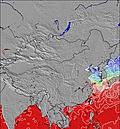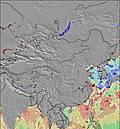Gyongpo Beach Water Temperature and Wetsuit Guide
(South Korea)
- Forecast
- Maps
- Live
- Weather State
- Spot Information
|
Today's Gyongpo Beach sea temperature is 22.2 °C.
Statistics for 08 Jul (1981–2005)
– mean: 21.2 °C,
range: 18.1 °C
to 23.0 °C
|
Very warm air temperatures and warm water(22 °C) too at Gyongpo Beach, warm enough for wearing board shorts and a rash vest in the surf. Cloudy, but feeling very pleasant in and out of the water.
(click thumbnails to expand)
Below is a graph of Historical Sea Surface Temperature for Gyongpo Beach. This has been derived from analysis of two decades of oceanographic satellite measurements of nearby open water. We have calculated the average water temperature variation around the year as well as the extremes that have been observed on each date.

All of the graphs for the surf breaks presented on Surf-Forecast.com are on the same scale to enable comparison between locations around the world.
Gyongpo Beach sea water temperatures peak in the range 20 to 27°C (68 to 81°F) on around the 10th of August and are at their lowest on about the 1st of March, in the range 6 to 9°C (43 to 48°F). Gyongpo Beach sea water temperatures are always warm reach their warmest in early to mid August. You'll need a 2mm neoprene top or a shorty at dawn/dusk or if it's windy. The lowest sea water temperatures at Gyongpo Beach mean that you will need a flexible 6/5/4mm wetsuit or a well fitting 5/4mm wetsuit with gloves and 5mm neoprene booties and a hood to surf here at the beginning of March.
Actual sea surface water temperatures close to shore at Gyongpo Beach can vary by several degrees compared with these open water averages. This is especially true after heavy rain, close to river mouths or after long periods of strong offshore winds. Offshore winds cause colder deep water to replace surface water that has been warmed by the sun. Air temperature, wind-chill and sunshine should also be considered before deciding on the kind of wetsuit needed to stay warm when surfing at Gyongpo Beach. Refer to our detailed weather forecasts for this information.









 Nearest
Nearest